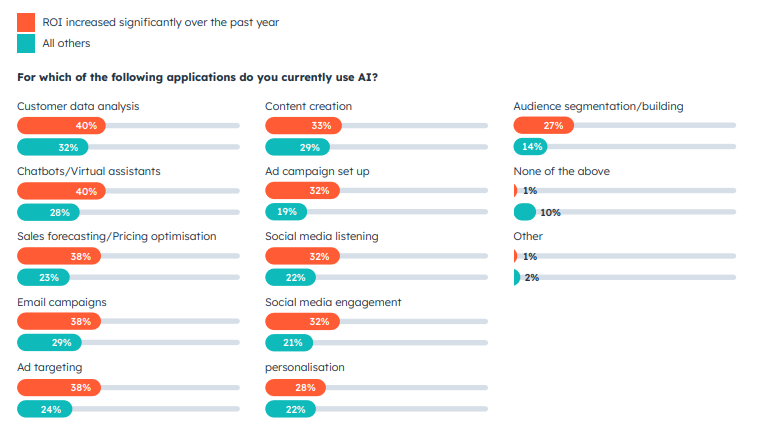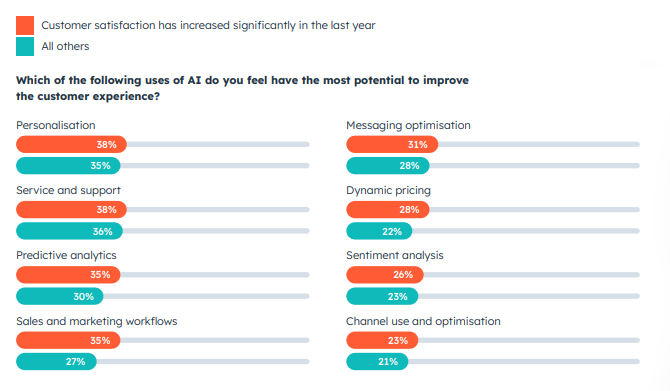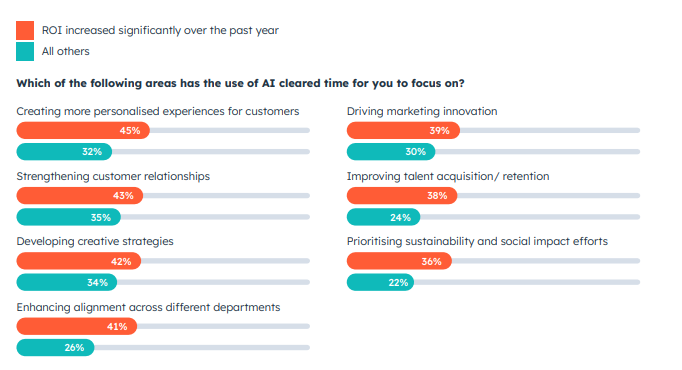How are marketers using AI and data to improve their marketing results? New research from HubSpot and LinkedIn shows that marketers in the Benelux are ahead of their European colleagues in this regard, with, among other things, a higher return on investment (ROI) as a result. Let’s dive into the numbers.
Making data-driven decisions
Benelux marketers are leaders in data and team integration, with some 80% using data to drive most or even all of their marketing decisions.
Marketers who rely and build on data the most experience a number of positive results:
- They are more than twice as confident in their teams’ ability to exceed goals for the coming year.
- They are more satisfied with the opportunities to deliver an exceptional customer experience.
- And they see a 4x greater improvement in customer satisfaction than others.
Marketers in the Benelux do see a number of challenges for data-driven work that fall under ‘how to get the data’ and ‘how to make the data work for you’. The most important issues are personalization, customer segmentation and predictive analytics (predictive analytics).
The Adoption of AI
The report distinguishes between 2 phases of AI adoption and it is interesting to see which phase your organization is in:
- AI Explorers are investigating and identifying opportunities. They are testing the use of AI and have implemented it in some workflows.
- AI Adopters are already a bit further, because they have optimized the use of AI and want to scale up. AI already plays a fundamental role in strategic decisions.
Both groups indicate that they want to invest more in AI in the coming year (approximately the same amount). They do indicate different challenges for the adoption of AI.
The top 5 challenges of AI Explorers:
- Ensuring the accuracy of AI-generated content.
- Choosing the most effective tools to use.
- Understand and apply AI-driven insights.
- Exploring new AI applications for everyday tasks.
- Comply with copyright and compliance.
The top 5 challenges of AI Adopters:
- Ensuring the accuracy of AI-generated content.
- Understand and apply AI-driven insights.
- Comply with copyright and compliance.
- Choosing the most effective tools to use.
- Ensuring that the content matches the brand voice.
The return on investment when using AI
Hubspot and LinkedIn also examined the relationship between increased ROI and the use of AI tools. The companies that saw a significant increase in ROI in the past year used more AI in every application studied than their competitors.

How AI improves the customer experience
The report also examines so-called “CX winners,” companies that reported significant increases in customer satisfaction and were five times more likely to see an increase in ROI as a result. These CX winners say that the use of AI for personalization has the greatest potential to further improve customer satisfaction, followed by service and support, predictive analytics, and sales and marketing workflows.

Speaking of workflows, AI can also help free up time for marketers. AI tools could save the average employee around 2.5 hours per day. Time that can be redeployed to other tasks, such as nurturing customer relationships, turning data into smart strategies, and more creative campaigns.

The Biggest Challenges and Opportunities for AI Adoption
The marketers surveyed face a number of challenges:
- Budget. Marketers see the potential of AI, but see budget constraints as the biggest barrier to adoption.
- Finding the right tools. For example, there are a ton of AI tools out there, but which one is right for your business, the task you want to do, and what about integration with other tools?
- A shortage of specialized talent and expertise.
- Customer PrivacyMarketers are concerned about protecting customer data.
- Concerns about regulations.
- C-suite buy-in. Top companies must invest in the use of AI and data-driven marketing.
82% of marketers in the Benelux indicate that the use of AI has a positive impact on the customer experience. 77% report a higher ROI in the past year and 54% see significant success in the use of AI for personalization.
Companies in the Benelux also have the advantage of having enthusiastic marketing leaders: 86% are positive about AI adoption for marketing. That is the highest percentage in Europe.
The biggest concern for Benelux marketers is the lack of specialized talent and expertise. 43% see this as a barrier to further growth. According to the report, it is therefore an opportunity to spend time and budget on courses, training and education.
About the research
For the report ‘The Intersection of Marketing, Data and AI‘ more than 2,300 marketers across Europe were surveyed, including 208 respondents from the Netherlands and Belgium.
Source: www.frankwatching.com


